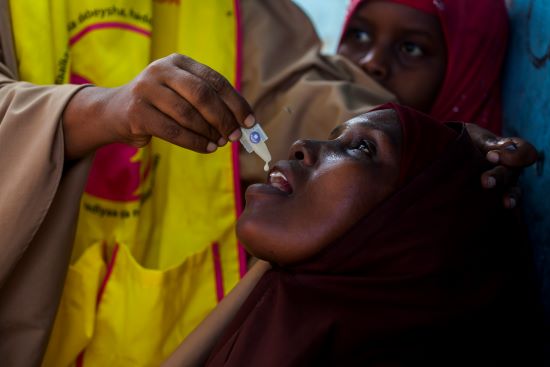 WHO Somalia/Fouzia Bano14 June 2022, Mogadishu – On 14 June 2022, Somalia rolled out the first round of a five-day campaign to vaccinate 934 511 people against cholera in nine high-risk districts that are currently facing ongoing outbreaks of cholera. The World Health Organization (WHO) and United Nations Children’s Fund (UNICEF) are supporting the Ministry of Health and Human Services, Federal Government of Somalia, to conduct the campaign. Gavi, the Vaccine Alliance, is providing vaccines and funds to implement this life-saving intervention.
WHO Somalia/Fouzia Bano14 June 2022, Mogadishu – On 14 June 2022, Somalia rolled out the first round of a five-day campaign to vaccinate 934 511 people against cholera in nine high-risk districts that are currently facing ongoing outbreaks of cholera. The World Health Organization (WHO) and United Nations Children’s Fund (UNICEF) are supporting the Ministry of Health and Human Services, Federal Government of Somalia, to conduct the campaign. Gavi, the Vaccine Alliance, is providing vaccines and funds to implement this life-saving intervention.
The oral cholera vaccination campaign aims to vaccinate people above one year of age, including pregnant women and internally displaced persons. It will be conducted in Hodan, Daynile, Dharkeneley, Wadajir, Jowhar, Baidoa, Afgoi, Wanlaweyne and Marka districts.
Since 2017, Somalia has witnessed several cholera outbreaks. These can be attributed to a large number of people having poor access to safe water and sanitation services, and natural hazards, including drought and floods, further exacerbated by protracted conflict and large-scale population displacement. Meanwhile, the ongoing drought in the country has had a grave impact on Somalis – while displacing over 770 000 people internally, it has dried up surface water sources and led to food insecurity in communities, which increases the risk of cholera infection as well as other waterborne diseases.
An estimated 49% of the population – 7.7 million people – require some form of humanitarian or protection assistance in Somalia, of whom 6.13 million are estimated to be affected by the current drought.
While cholera remains endemic in Somalia, and the current drought situation may have exacerbated the risk of a major outbreak across the country, vaccination against cholera with two doses given between 2 to 4 weeks apart is seen as a supplementary measure to stop the outbreak and control its spread. In addition, other proven and effective public health measures also prevent cholera transmission, such as maintaining good personal hygiene, improving access to safe water and practicing safe sanitation.
“To prevent cholera outbreaks in a sustainable way, we strongly advise affected communities to take two doses of cholera vaccine orally. In addition, we are urging our partners to assist us in improving access to water, sanitation, and hygiene facilities for vulnerable communities and the general public,” said H.E. Fawziya Abikar Nur, Minister of Health and Human Services, Federal Government of Somalia.
“While we need to step up our collective response to cholera and other waterborne diseases, especially in the areas of case management, we have over 2100 community health workers deployed in 78 districts, including in 24 drought-affected districts. They are carrying out risk communication activities at the household level to promote safe behavioural practices and maintain basic hygiene at personal and household level even in these trying conditions. These community health workers are also ensuring that sick children with profuse diarrhoea and vomiting and other signs of dehydration are immediately cared for and referred to nearly health centres for further assessment or treatment. These public health actions are saving lives from preventable causes, as populations, especially children, are very vulnerable during these emergencies, owing to hunger, starvation and malnutrition,” added Dr Mamunur Rahman Malik, WHO Representative to Somalia.
“Parents and caregivers can take life-saving preventive measures for their children by taking them to get the cholera vaccine drops. Children are very susceptible to preventable diseases like cholera, especially with low access to water during this drought,” said Angela Kearney, UNICEF Somalia Representative.
“Together, we are ensuring that 1 869 022 doses of the cholera vaccines are readily available for the campaign while social mobilizers educate affected communities. Vaccination alone is not enough, preventive measures such as good hygiene and access to health care are important.”
As of 15 May 2022, 4887 suspected cases of cholera, with 16 associated deaths, had been reported from 21 drought-affected districts in Somalia. Around 62% of these cases were children aged below five years, while around half of the cases were females.
A second round of the oral cholera vaccination campaign will be conducted within a few weeks following completion of the first round of the oral cholera vaccination campaign. The populations that received the first dose will be targeted to receive the second dose during the next round of the campaign to boost the affected population’s immunity.
------
For additional information, kindly contact:
Khadar Hussein Mohamud, Head of Coordination and Communications, Ministry of Health, Federal Government of Somalia, This e-mail address is being protected from spambots. You need JavaScript enabled to view it
Mukhtar Abdi Shube, Head of the Expanded Programme on Immunization (EPI) section, Ministry of Health, Federal Government of Somalia, This e-mail address is being protected from spambots. You need JavaScript enabled to view it
Fouzia Bano – WHO Chief of Staff ai, Communications Officer, This e-mail address is being protected from spambots. You need JavaScript enabled to view it
Lisa Hill – UNICEF Communications Specialist, This e-mail address is being protected from spambots. You need JavaScript enabled to view it




